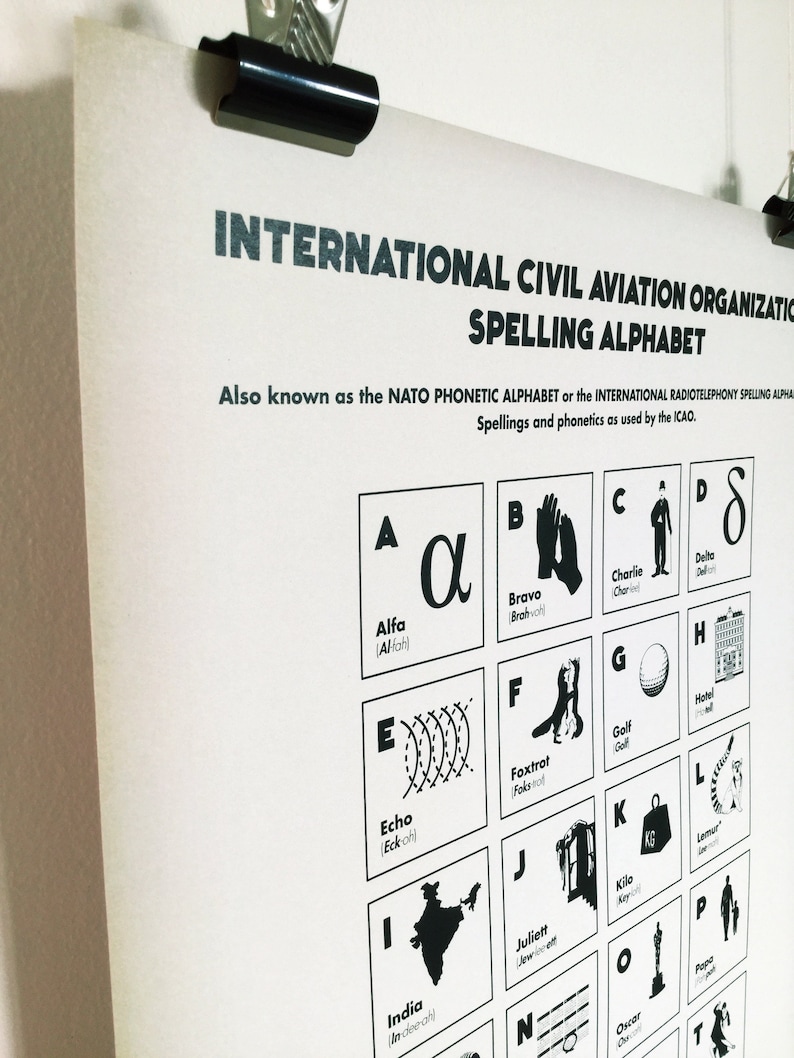

The ICAO states that the pronunciation of the words in the alphabet as well as numbers may vary according to the language habits of the speakers.

In the interests of uniformity, the FAA style of stressed syllables in BOLD will be used here (underlines might be confused with links). The ICAO indicates unstressed numeric syllables in lower case (stressed in UPPER CASE), unlike its own alphabet, where stressed syllables are UNDERLINED UPPER CASE (unstressed in UPPER CASE). Unless otherwise specified, the spelling and pronunciation given is that officially prescribed by the ICAO and adopted by the FAA and the ITU.
ICAO RADIOTELEPHONY SPELLING ALPHABET CODE
This article uses material from the Wikipedia article NATO phonetic alphabet, which is released under the Creative Commons Attribution-Share-Alike License 3.0.FAA radiotelephony phonetic alphabet and Morse code chart. government referred to the Viet Cong guerrillas and the group itself as VC, or Victor Charlie the name "Charlie" became synonymous with this force. Several letter codes and abbreviations using the spelling alphabet have become well-known, such as Bravo Zulu (letter code BZ) for "well done", Checkpoint Charlie (Checkpoint C) in Berlin, and Zulu Time for Greenwich Mean Time or Coordinated Universal Time. It is often used in a medical context as well, to avoid confusion when transmitting information. Most major airlines use the alphabet to communicate passenger name records (PNRs) internally, and in some cases, with customers.
ICAO RADIOTELEPHONY SPELLING ALPHABET SERIAL
It has been used often by information technology workers to communicate serial or reference codes (which are often very long) or other specialised information by voice.

For example, it is often used in the retail industry where customer or site details are spoken by telephone (to authorize a credit agreement or confirm stock codes), although ad-hoc coding is often used in that instance. In addition to the traditional military usage, civilian industry uses the alphabet to avoid similar problems in the transmission of messages by telephone systems. The unusual pronunciation of certain numbers was designed to reduce confusion as well. Using "Delta" instead of "D" avoids confusion between "DH98" and "BH98" or "TH98". For instance the message "proceed to map grid DH98" could be transmitted as "proceed to map grid Delta-Hotel-Niner-Ait". International adoptionĪfter the phonetic alphabet was developed by the International Civil Aviation Organization ( ICAO) it was adopted by many other international and national organizations, including the International Telecommunication Union (ITU), the International Maritime Organization (IMO), the United States Federal Government (as Federal Standard 1037C: Glossary of Telecommunications Terms, and its successors ANSI T1.523-2001 and ATIS Telecom Glossary (ATIS-0100523.2019), (using English spellings of Alfa and Juliett), the United States Department of Defense (using standard spellings), the Federal Aviation Administration (FAA), and the International Amateur Radio Union (IARU), the American Radio Relay League (ARRL), the Association of Public-Safety Communications Officials-International (APCO) and by many military organizations such as the North Atlantic Treaty Organization (NATO) and the now-defunct Southeast Asia Treaty Organization (SEATO).Ī spelling alphabet is used to spell parts of a message containing letters and numbers to avoid confusion, because many letters sound similar, for instance "n" and "m" or "f" and "s" the potential for confusion increases if static or other interference is present. The 26 code words in the spelling alphabet are assigned to the 26 letters of the English alphabet in alphabetical order as follows: Alfa, Bravo, Charlie, Delta, Echo, Foxtrot, Golf, Hotel, India, Juliett, Kilo, Lima, Mike, November, Oscar, Papa, Quebec, Romeo, Sierra, Tango, Uniform, Victor, Whiskey, X-ray, Yankee, Zulu. Such spelling alphabets are often called "phonetic alphabets", but they are unrelated to phonetic transcription systems such as the International Phonetic Alphabet. To create the alphabet, the International Civil Aviation Organization (ICAO) assigned codewords acrophonically to the letters of the English alphabet, so that letters and numbers would have distinct names that would be most easily understood by those who exchange voice messages by radio or telephone, regardless of language differences or the quality of the communication channel.

The International Radiotelephony Spelling Alphabet, commonly known as the NATO phonetic alphabet or the ICAO phonetic alphabet, is the most widely used radiotelephone spelling alphabet.


 0 kommentar(er)
0 kommentar(er)
